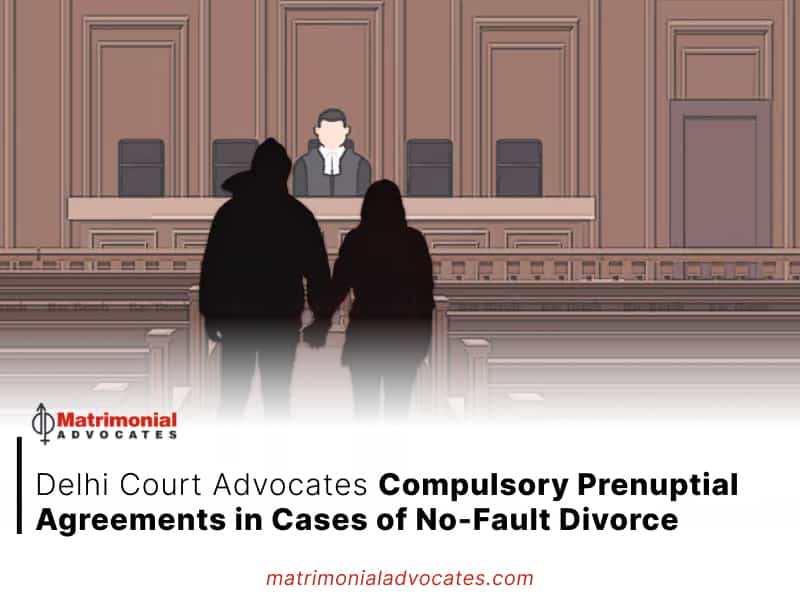
The Court stressed that refusal to grant divorce would force parties to suffer further and would amount to “law-induced mental cruelty.”
In a recent legal ruling, a Delhi court has advocated the compulsory inclusion of prenuptial agreements as a prerequisite for matrimonial unions. The primary intent behind this advocacy is to mitigate the emotional distress commonly encountered by parties embroiled in legal disputes. This pronouncement was articulated by Family Court Judge Harish Kumar during the adjudication of a no-fault divorce case at the Patiala House Courts, which entailed a protracted seven-year legal dispute involving a married couple.
“Time has come to make compulsory prenuptial agreement to be executed before appointed authority after counseling of the parties about the possible risk of marriage going haywire for variety of reasons and making it mandatory to report breach every time breach occurs under intimation to the party allegedly at fault, making it further clear that if breach not reported he/she would not be heard later on that he/she did not report thinking that she/he would improve,” the Court said.
In a recent legal decision, a Delhi court has suggested that prenuptial agreements should be required before getting married. The main goal of this suggestion is to help reduce the emotional stress that people often go through during legal disputes. This suggestion came from Family Court Judge Harish Kumar during a no-fault divorce case at the Patiala House Courts, involving a married couple in a long-lasting seven-year legal dispute.
“This Court, therefore, in the present case in the facts and circumstances as noted above, without going into question as who is at fault so as to allow husband’s or wife’s prayer for dissolution of their marriage on fault theory, hereby dissolve their marriage under Section 13B of the Hindu Marriage Act, 1955 taking their respective prayer to dissolve their marriage (based on the faults of other) as their respective consent to dissolve their marriage, from the date of decree to be drawn up following this judgement,” the Court said.
The Court has observed a notable surge in matrimonial conflicts of late, and a considerable portion of these cases lacks substantial evidence of explicit mistreatment. Nevertheless, if an individual opts to initiate a divorce for any cause, they must commence legal proceedings and level allegations against the other party as per the judge’s instructions.
“[These allegations] snowball into counter allegation and Court of law is pressed into service to find out something which never existed because difference of opinion and disagreements are also reported as an act of cruelty. Till such time real effort is made by the society as whole and the legislature in particular, temple of justice will keep on devising way to respond to the grave situation,” the Court added.
The couple, who entered into matrimony in 2011 and had offspring, mutually sought a divorce, yet were unable to arrive at a consensus on pivotal matters, necessitating legal intervention.
Judge Kumar meticulously scrutinized the case and adjudicated that in scenarios marked by profound marital discord with insurmountable issues, it would be inequitable to impede the divorce process. The Court contended that withholding a divorce solely on the grounds of a party’s inability to substantiate misconduct by the other would needlessly prolong the suffering of both parties, irrespective of culpability.
The Court further acknowledged that refraining from granting a divorce in such instances would subject the involved parties to prolonged legal procedures, resulting in substantial emotional distress. The Court recognized that some may interpret this decision as an attempt to circumvent a meticulous examination of evidence during the legal proceedings. However, the judge elucidated that resolving intricate challenges, especially within familial contexts, to foster peace and harmony, serves the greater interests of the state and society
“Spirit of the Family Court Act is also to bring out settlement between the parties, which means putting quietus to their dispute. In the present case if prayer of husband or wife is accepted holding the other spouse guilty of matrimonial offense, the person against whom findings would go will take the matter to higher forum thus drag the other into rigmarole of further round of litigation with added agony and harassment. Similarly, refusal of their respective prayer, if they failed to prove their allegation, would also lead to law induced mental cruelty as discussed above,” the Court explained further.
In the case of child custody, the Court has officially appointed both parents as joint legal custodians, granting them the responsibility to make decisions concerning their child’s education, school-related activities, and extracurricular involvement. Furthermore, it is mandated that the mother includes the father’s name in their daughter’s school records.
Because both parents live in close proximity to each other within the Gurugram area, the Court has granted the father the privilege of daily visitation and weekend overnight access to their daughter.
In matters of financial support, the Court has decreed an equitable distribution of responsibilities, requiring both parents to share the financial burden equally by contributing 50% of the expenses associated with the upbringing and care of their daughter.





